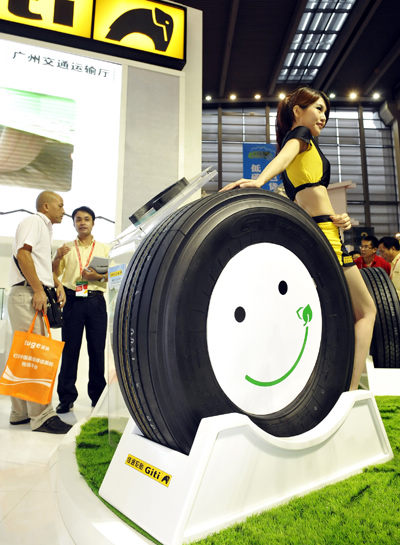|
 |
|
GREEN TIRE: Giti Tire Corp. demonstrates its latest fuel-saving tires at the China International Logistics and Transportation Fair in Shenzhen in October 2011 (LIANG XU) |
Two years after imposing punitive tariffs on Chinese-manufactured passenger vehicle and truck tires, the United States may launch a new round against truck and bus tires imported from China, reported 21st Century Business Herald based in Guangzhou, capital of Guangdong Province.
An official from the China Rubber Industry Association (CRIA) told the newspaper that they were trying to communicate with the U.S. side.
In September this year the WTO upheld the 2009 U.S. decision to impose punitive duties on tires imported from China.
Even though the WTO ruling was dubbed "a tremendous victory for the United States as well as for American workers and manufacturers" by U.S. Trade Representative Ron Kirk, the United States is not necessarily the beneficiary.
The punitive measure failed to help reduce U.S. tire imports, but hurt China's tire makers.
The U.S. tire imports did not decline after the punitive measure.
Comparing the first half of 2010 with 2009, total U.S. tire imports affected by the tariff are up 30 percent by value. China's share of those imports has dropped from a peak of 45 percent in August 2009 to just 24 percent in June 2010, according to a briefing issued by the U.S.-China Business Council in 2010.
U.S. imports of Chinese tires fell by 23.6 percent in 2010 and by a further 6 percent in the first half of 2011, while U.S. tire imports overall grew by 20.2 percent and 9 percent, respectively, according to statistics provided by the Chinese Preferment Mission to the WTO.
In other words, Americans are buying more tires from overseas, just not from China.
"It shows that tires made in China did not pose a threat to U.S. enterprises," said Sun Yewen, an analyst with Caixun.com. "But the punitive tariff deeply hurt Chinese tire makers," he said.
Since the three-year, tiered tariff on tires imported from China—35 percent the first year, 30 percent the second year and 25 percent the third year—was imposed in 2009, China's tire industry has bled profits.
According to CRIA, the safeguard measures have caused nearly 30 tire makers in China to reduce their output or halt production, and more than 100,000 jobs have been cut.
Despite the fact that hundreds of thousands of Chinese tire workers lost their jobs, the tire tariff also failed to boost job creation in the United States.
Since the implementation of special protection measures in 2009, the U.S. tire industry's employment has declined, rather than increased. U.S. tire manufacturing employment was 10 percent lower in the first five months of 2010, compared with the same period in 2009 before the tariffs were applied, said the U.S.-China Business Council.
Thomas Prusa, professor of economics at Rutgers University, estimates that "the tire manufacturing industry will experience little to no job creation as a result of the tariff. Under the best-case scenario, more than a dozen jobs will be lost for every job protected." Prusa estimates a net loss of at least 25,000 jobs in the United States as the result of the tariff being imposed.
The U.S tire industry is still hurting and tires are still expensive, said Ma Guangyuan, an independent analyst.
| 